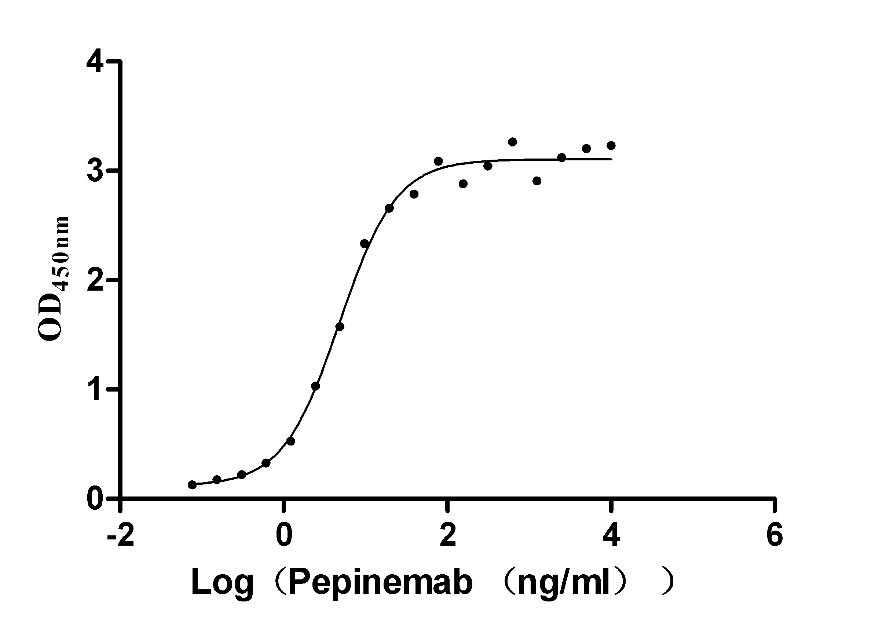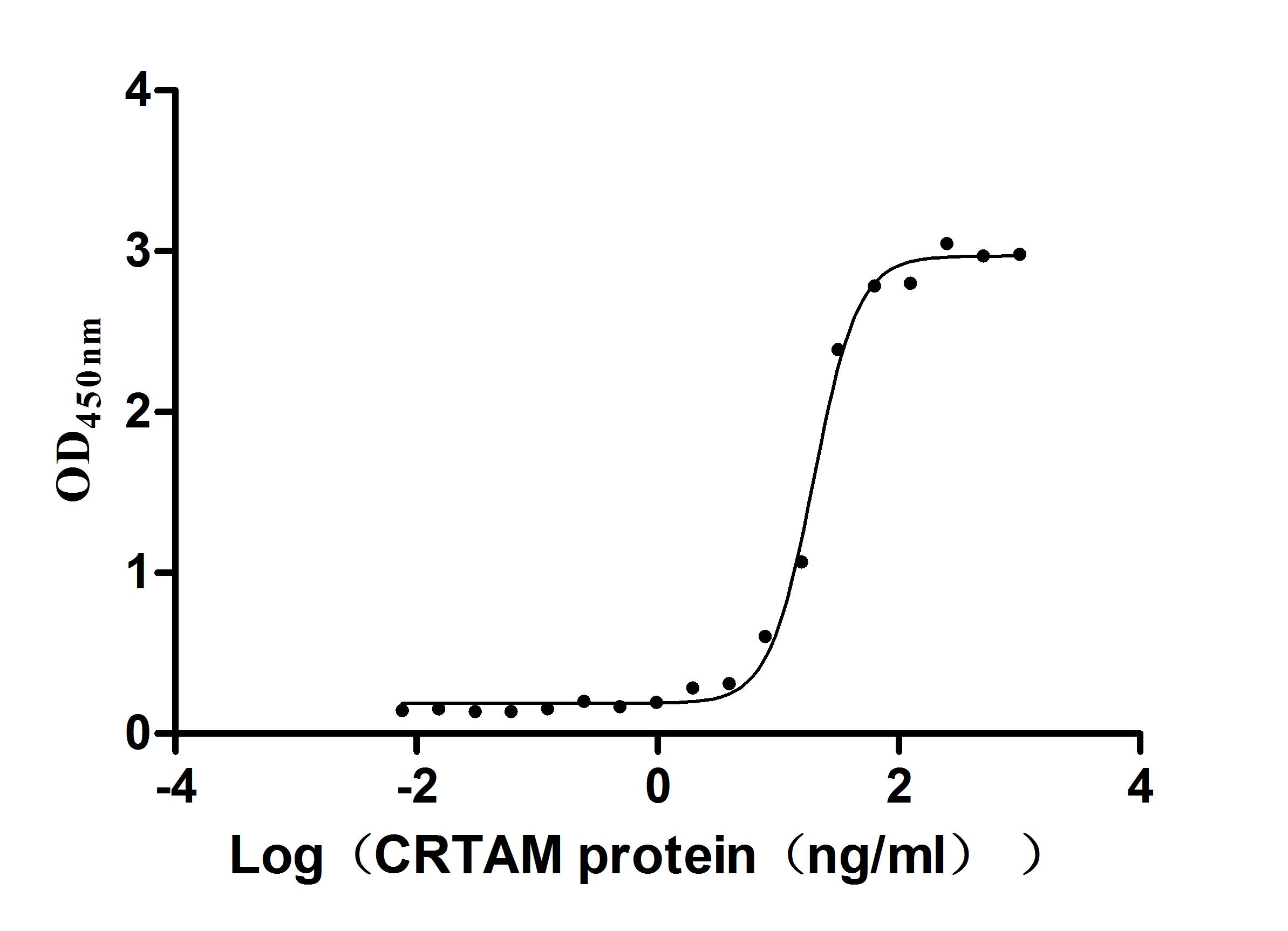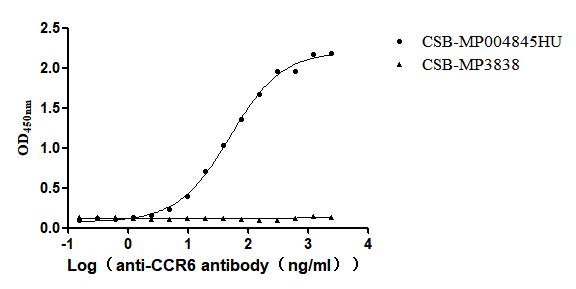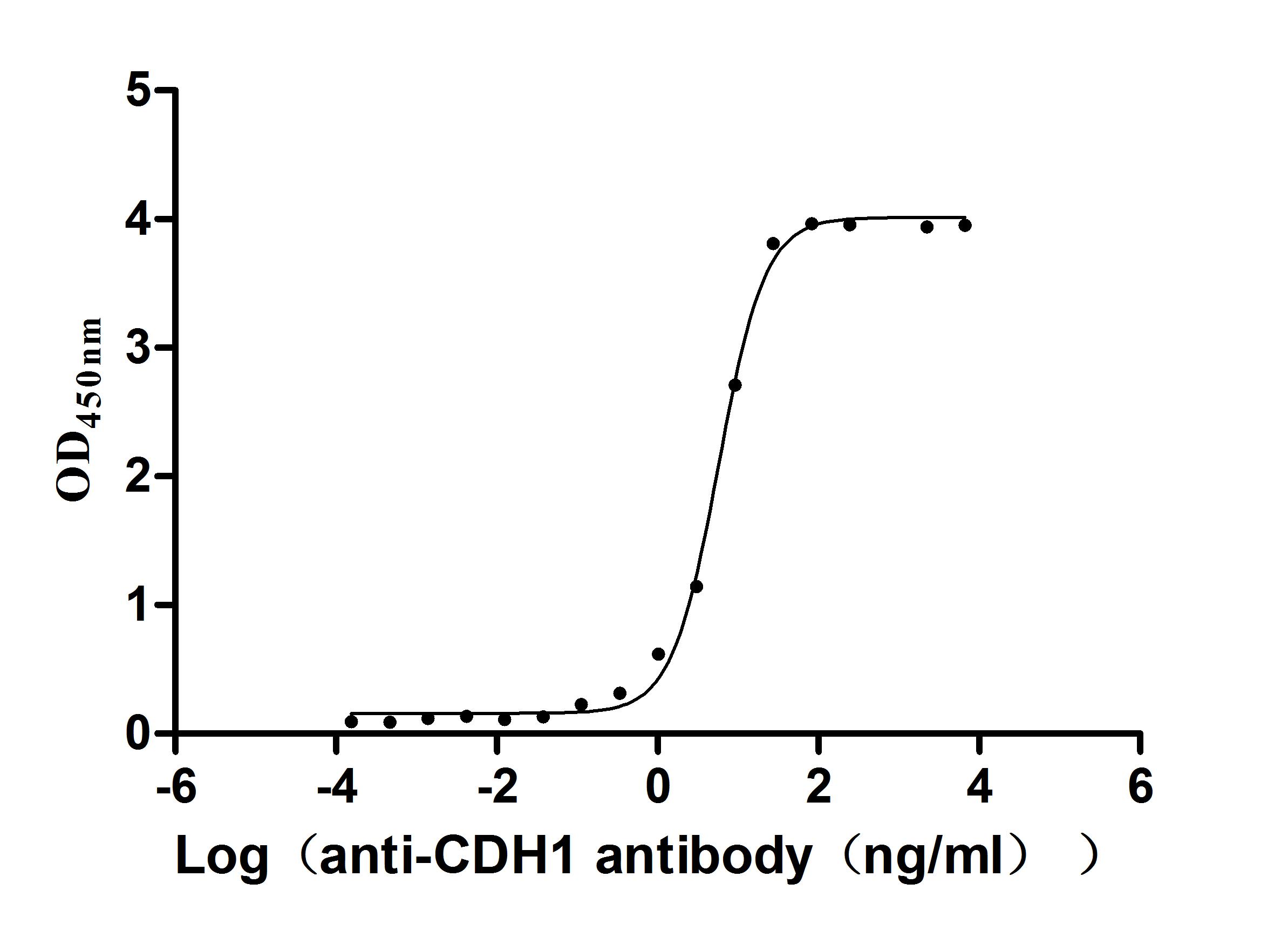Recombinant Mouse Coxsackievirus and adenovirus receptor homolog (Cxadr), partial
-
货号:CSB-YP006237MO1
-
规格:
-
来源:Yeast
-
其他:
-
货号:CSB-EP006237MO1
-
规格:
-
来源:E.coli
-
其他:
-
货号:CSB-EP006237MO1-B
-
规格:
-
来源:E.coli
-
共轭:Avi-tag Biotinylated
E. coli biotin ligase (BirA) is highly specific in covalently attaching biotin to the 15 amino acid AviTag peptide. This recombinant protein was biotinylated in vivo by AviTag-BirA technology, which method is BriA catalyzes amide linkage between the biotin and the specific lysine of the AviTag.
-
其他:
-
货号:CSB-BP006237MO1
-
规格:
-
来源:Baculovirus
-
其他:
-
货号:CSB-MP006237MO1
-
规格:
-
来源:Mammalian cell
-
其他:
产品详情
-
纯度:>85% (SDS-PAGE)
-
基因名:Cxadr
-
Uniprot No.:
-
别名:Cxadr; Car; Coxsackievirus and adenovirus receptor homolog; CAR; mCAR
-
种属:Mus musculus (Mouse)
-
蛋白长度:Partial
-
蛋白标签:Tag type will be determined during the manufacturing process.
The tag type will be determined during production process. If you have specified tag type, please tell us and we will develop the specified tag preferentially. -
产品提供形式:Lyophilized powder
Note: We will preferentially ship the format that we have in stock, however, if you have any special requirement for the format, please remark your requirement when placing the order, we will prepare according to your demand. -
复溶:We recommend that this vial be briefly centrifuged prior to opening to bring the contents to the bottom. Please reconstitute protein in deionized sterile water to a concentration of 0.1-1.0 mg/mL.We recommend to add 5-50% of glycerol (final concentration) and aliquot for long-term storage at -20℃/-80℃. Our default final concentration of glycerol is 50%. Customers could use it as reference.
-
储存条件:Store at -20°C/-80°C upon receipt, aliquoting is necessary for mutiple use. Avoid repeated freeze-thaw cycles.
-
保质期:The shelf life is related to many factors, storage state, buffer ingredients, storage temperature and the stability of the protein itself.
Generally, the shelf life of liquid form is 6 months at -20°C/-80°C. The shelf life of lyophilized form is 12 months at -20°C/-80°C. -
货期:Delivery time may differ from different purchasing way or location, please kindly consult your local distributors for specific delivery time.Note: All of our proteins are default shipped with normal blue ice packs, if you request to ship with dry ice, please communicate with us in advance and extra fees will be charged.
-
注意事项:Repeated freezing and thawing is not recommended. Store working aliquots at 4°C for up to one week.
-
Datasheet :Please contact us to get it.
相关产品
靶点详情
-
功能:Component of the epithelial apical junction complex that may function as a homophilic cell adhesion molecule and is essential for tight junction integrity. Also involved in transepithelial migration of leukocytes through adhesive interactions with JAML a transmembrane protein of the plasma membrane of leukocytes. The interaction between both receptors also mediates the activation of gamma-delta T-cells, a subpopulation of T-cells residing in epithelia and involved in tissue homeostasis and repair. Upon epithelial CXADR-binding, JAML induces downstream cell signaling events in gamma-delta T-cells through PI3-kinase and MAP kinases. It results in proliferation and production of cytokines and growth factors by T-cells that in turn stimulate epithelial tissues repair.
-
基因功能参考文献:
- In blastocysts, CAR was expressed at the cell contacts within the inner cell mass as well as in the trophectoderm (TE) where CAR was found together with ZO1 at the apical contacts, suggesting that CAR builds up apical TJs in TE and mediates cell adhesion in TE and inner cell mass. CAR was expressed in TE of implanting embryos as well as endometrial epithelium. PMID: 27226313
- Coxsackievirus and Adenovirus Receptor and potentially an unidentified factor present in mouse serum might be important mediators of Human adenoviral serotype 5 transduction. PMID: 28381574
- Podocyte-Specific Deletion of Murine CXADR Does Not Impair Podocyte Development, Function or Stress Response PMID: 26076477
- the intracellular domain of CAR differentially regulates AdV entry and trafficking. Our study highlights the mechanistic differences that a receptor can have for two viruses from the same family. PMID: 26136571
- Conclude that CXADR possesses no direct role in testicular physiology in vivo. PMID: 24625359
- with significant difference). At dpc 8.5, CAR expression was increased slightly again. It is concluded that during implantation, the expression of CAR mRNA and protein is declined, resulting in the impairment of tight junction. PMID: 22282254
- novel modifier of ventricular conduction and arrhythmia vulnerability in the setting of myocardial ischemia PMID: 24291282
- CAR belongs to the increasing list of cell surface molecules that undergo ectodomain shedding and that are substrates for -secretase-mediated RIP. PMID: 24015300
- These findings indicate that CAR plays an important role in the initiation of coxsackievirus B virus infections and is closely associated with hepatotropism and age-specific susceptibility. PMID: 23620416
- CAR plays an essential role in development of the lymphatic vasculature in the mouse embryo by promoting appropriate formation of lymphatic endothelial cell-cell junctions. PMID: 22624044
- CAR exerts important functions in the physiology of several organs in vivo PMID: 21674029
- Data show for the first time that CAR upregulation in the adult mouse heart induces cardiac inflammation reminiscent of early viral myocarditis. PMID: 21352828
- increased CAR expression has a role in inducing cardiomyopathy PMID: 20144615
- crystal structure of junctional adhesion molecule-like protein (JAML) and coxsackie and adenovirus receptor; data show how CAR-mediated clustering of JAML recruits phosphoinositide 3-kinase to a JAML intracellular sequence motif PMID: 20813955
- Adoptive transfer of Tregs protected mice from coxsackievirus B3-induced myocarditis through the transforming growth factor beta-coxsackie-adenovirus receptor pathway. PMID: 20530002
- Blocking antibodies were found to inhibit neurite extension in retina organ and retinal explant cultures, whereas the application of extracellular CAR domains promoted neurite extension and adhesion to extracellular matrices. PMID: 20181587
- Review: Receptor for the group B coxsackieviruses and adenoviruses, CAR PMID: 11479928
- Coxsackievirus and adenovirus receptor (CAR) is found in complex with the PDZ domain-containing protein ligand-of-numb protein-X (LNX) PMID: 12468544
- The mCAR gene is situated on the distal portion of murine chromosome 16, and is composed of at least eight exons, with intron-exon boundaries similar to those reported for the human CAR gene PMID: 12823902
- CAR provides positive survival signals to cardiomyocytes that are essential for normal heart development. PMID: 15864812
- CAR is a partner in a protein complex organized at specific subcellular sites by Ligand-of-Numb Protein-X2 PMID: 15979067
- During a specific temporal window, CAR expression on cardiomyocytes is essential for normal cardiac development. PMID: 16543498
- Attachment of mouse adenovirus type 1 (MAV-1) to Chinese hamster ovary (CHO) cells was not increased by stable transfection with mouse CAR, whereas binding efficiency of Ad2 was 20-fold higher in the mouse CAR-transfectant compared to wild type cells. PMID: 16806202
- CAR is an immunoglobulin domain-containing protein that bears homology to cell-adhesion molecules suggesting the possibility that it may participate in organization of the developing olfactory system. PMID: 16841169
- Overexpression of CAR may lead to physiological dysfunction by disturbing sarcolemmal integrity (through dystrophin deficiency), impairing sarcolemmal repair (through dysferlin deficiency), and interfering with normal signaling . PMID: 17148677
- present work shows that stable and transient expression of CAR in tumor cells reduced lung metastasis in an experimental lung metastasis model; CAR expression likely acts as a metastatic suppressor PMID: 17546646
- A function for CAR in testis morphogenesis and in migration of germ cells across the blood-testis barrier during spermatogenesis. PMID: 17690169
- Activation of STAT1 protein is an early event in coxsackievirus-induced myocarditis preceding enhanced CAR expression during tissue reorganization. PMID: 18329552
- CAR mediates atrioventricular-node function in the murine heart. PMID: 18636119
- Systemic delivery of PEGPE-adenovirus complex is an effective tool of adenoviral delivery as it overcomes limitation due to CAR deficiency of target cells while reducing hepatic uptake and enhancing adenoviral gene expression in tumors. PMID: 18779655
- Results indicate that CAR is not only relevant for virus uptake and cardiac remodeling but also has a previously unknown function in the propagation of excitation from the atrium to the ventricle. PMID: 18794341
- it is proposed that adenovirus CAV-2 transport in motor neuron is dictated by an innate trafficking of CAR, suggesting an unsuspected function for this adhesion protein during neuronal homeostasis PMID: 19461877
- These results demonstrate a critical function for coxsackievirus and adenovirus receptor in the pathogenesis of group B coxsackievirus infection in vivo and in virus tropism for the heart and pancreas. PMID: 19616768
- CAR activation dramatically improves fatty liver and ameliorates hyperglycemia. PMID: 19850873
- This manuscript demonstrates a unique role for CAR in the AV-node related to localization of connexin 45 to the cell-cell junction. Atrioventricular node block occurs in the absence CAR. PMID: 18636119
显示更多
收起更多
-
亚细胞定位:[Isoform 1]: Cell membrane; Single-pass type I membrane protein. Basolateral cell membrane; Single-pass type I membrane protein. Cell junction, tight junction. Cell junction, adherens junction.; [Isoform 3]: Secreted.
-
组织特异性:Expressed in liver, kidney, heart, lung, and brain. In skeletal muscle is found at the neuromuscular junction. In cardiac muscle, isoform 1 and isoform 2 are found at intercalated disks.
-
数据库链接:
KEGG: mmu:13052
STRING: 10090.ENSMUSP00000023572
UniGene: Mm.66222
Most popular with customers
-
Recombinant Human Semaphorin-4D (SEMA4D), partial (Active)
Express system: Mammalian cell
Species: Homo sapiens (Human)
-
Recombinant Human Cell adhesion molecule 1 (CADM1), partial (Active)
Express system: Mammalian cell
Species: Homo sapiens (Human)
-
Recombinant Human C-C chemokine receptor type 6(CCR6)-VLPs (Active)
Express system: Mammalian cell
Species: Homo sapiens (Human)
-
Recombinant Human Dipeptidase 3(DPEP3), partial (Active)
Express system: Mammalian cell
Species: Homo sapiens (Human)
-
Recombinant Human Cadherin-1(CDH1),partial (Active)
Express system: Mammalian cell
Species: Homo sapiens (Human)
-
Recombinant DT3C (Diphtheria toxin & spg 3C domain) for Antibody Internalization Assay (Active)
Express system: E.coli
Species: N/A


















